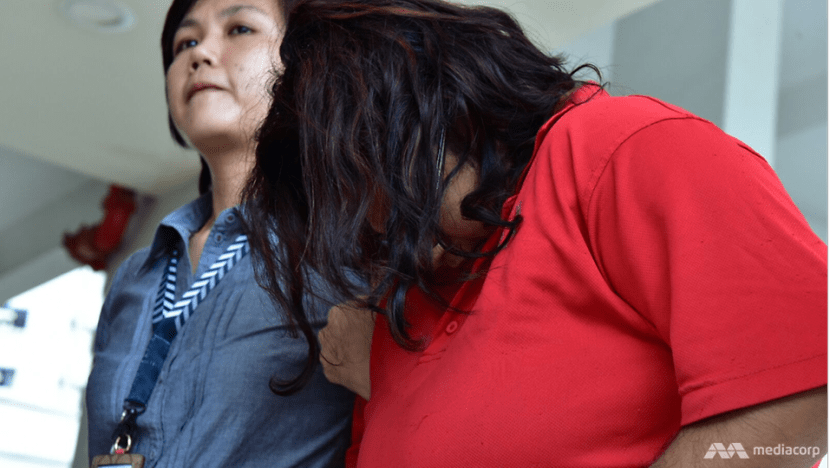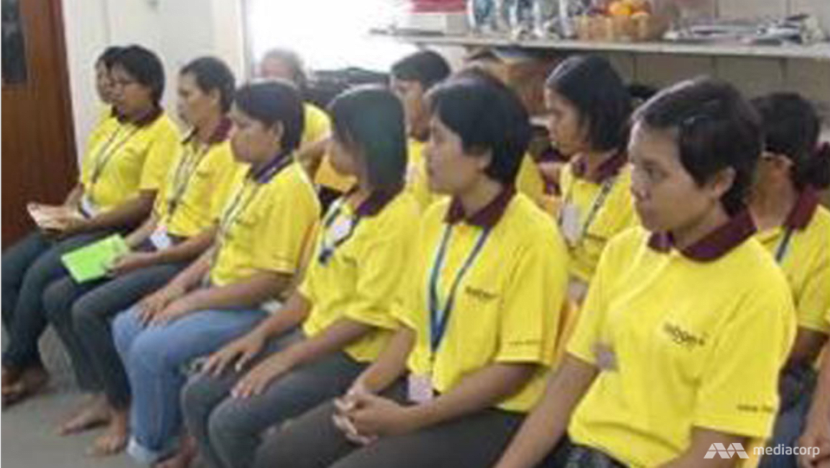commentary Commentary
Commentary: Pluralistic ignorance and why overcoming it can prevent abuse of domestic workers
The majority of employers know they cannot restrict the rest days of their domestic workers or keep their salaries or passport. However, some still do so because they believe everyone else does it. It’s time for a change, says Shamsul Kamar.

A photo of Myanmar national Piang Ngaih Don, who was killed by her employer in 2016. (Photo: Facebook/Helping Hands for Migrant Workers, Singapore)
SINGAPORE: In 1964, Catherine Susan “Kitty” Genovese was brutally murdered across the street from where she lived.
A New York Times article on the murder suggested 38 witnesses saw the murder yet none of them came to her aid.
Although how many saw the incident and did nothing was a source of contention, the murder nonetheless prompted a series of studies by psychologists to understand why witnesses to crimes are less likely to offer help to victims when there are others present.
This is famously known as Genovese Syndrome or the bystander effect.
READ: Commentary: Myanmar domestic worker's death and the problem with the bystander effect
The death of domestic worker Piang Ngaih Don reported recently gave rise to many similar questions on whether the torture she suffered may have gone on unnoticed for such a prolonged period.
It had taken place in a densely populated housing estate where angry voices of perpetrators and cries of the victim could have been easily picked by neighbours.
In an ideal scenario, many things could have averted her death. The employment agent could have visited her employer’s home to find out how she was coping.
The doctor could have questioned her employer further about the bruises found on Piang Ngaih Don or could have insisted on a more thorough medical examination.
A police report could have been made.

Any one of these timely community interventions could have saved her life. Unfortunately, this is a regretful story of “could have beens” in an imperfect world where the life of a young mother was lost for reasons we are still learning.
Studies in psychology show that while having more bystanders increases the likelihood a victim of crime will eventually receive help, an individual bystander is less likely to help because of diffused responsibility given the presence of others.
Bystanders assume that somebody else will help if the situation is indeed life-threatening, and therefore are less likely to offer help themselves.
OVERCOMING PLURALISTIC IGNORANCE
This bystander effect extends to other issues that impact FDWs.
In the course of our work, the Centre for Domestic Employees (CDE) has met many who have advocated for better treatment of foreign domestic workers (FDWs) such as granting them reasonable access to mobile phones, weekly rest days, and timely and full payment of salary.
These are basic employment rights to be accorded to all FDWs and we have campaigned regularly for these rights.
READ: Commentary: Can we ever cut our dependence on foreign domestic workers?
But while most of us agree the rights of FDWs should be upheld, practices running counter to these rights have persisted and are implicitly accepted by employers.
Out of over 2,000 FDWs we assisted in 2020, almost 50 per cent of them faced salary issues or some form of verbal and physical abuse, did not receive sufficient rest and food, were not given reasonable access to mobile phones, or were deprived of their weekly rest days.

As a society, Singapore must overcome this pluralistic ignorance.
Pluralistic ignorance refers to situations where individuals do not believe in a practice yet continue to engage in it because they wrongly assume that the practice is widely accepted.
In our work, we see employers saying that even though they know that it is incorrect for them to safekeep their FDWs’ salary, work permit, and passport or restrict their weekly off days, they do it because “everyone else they know is doing it”.
READ: Commentary: The wrangling over rest days foreign domestic workers and their employers face in Phase 2
Like the child in The Emperor’s New Clothes, who rightly pointed out that the emperor is not wearing any clothes, we must recognise and reject actions we intuitively know are wrong, even if others keep silent.
Abusing FDWs has no place in our society, just as withholding their other employment rights must be stopped.
Such acts must be called out by anyone who comes across them. We have a moral responsibility to ensure every member of our society, especially those with less means to fend for themselves, can lead a dignified life.
A SYSTEMS APPROACH TO STEM ABUSE
Stemming abuse of FDWs requires both individual and whole-of-society efforts.
As a society, we must recognise that FDWs are fellow human beings who have left their countries and families behind to work in Singapore so that they can secure a better future for their loved ones.
FDWs, like all of us, have hopes, dreams, fears, and aspirations. They too, like us, look forward to spending time with their loved ones, but are unable to do so because they are working here, far away from their homes.
Employers should demonstrate empathy, treat FDWs as part of their extended household, and not regard FDWs as “lesser beings” or commodities.
READ: Commentary: Instead of robots or commodities, why not treat foreign domestic workers like fellow human beings?
At a policy level, the Ministry of Manpower’s (MOM) commitment to work with the Ministry of Health to tighten the mandatory reporting structure for doctors to alert possible cases of abuse to the authorities is a welcome move.
Medical professionals have a duty of care to report suspicious-looking injuries even when FDWs chose to remain mum.

Like how crime scene investigators use dioramas to aid their investigations, medical professionals can consider using pictorial diagrams, or translated printouts to help them better understand the medical needs or messages of FDWs.
CDE has conducted interviews for newly deployed FDWs on MOM’s behalf since November 2017. FDWs are randomly selected to attend these interviews between three to six months of their deployment.
These interviews are structured to be early touchpoints to find out how FDWs are coping and serve as an opportunity to pick up possible welfare and employment issues so that CDE can take active steps to intervene before these issues escalate.
SIGN UP: For CNA’s Commentary weekly newsletter to explore issues beyond the headlines
READ: Commentary: Why a respectful relationship between foreign domestic workers and employers is in everyone’s interest
To further enhance community detection of abuse, we are working with the International Labour Organisation under its Safe and Fair Migration programme to design and implement a community responder programme where we train community and union leaders to detect possible cases of abuse and flag those cases to CDE and authorities for intervention.
This is targeted to be launched by early 2022.
Aside from tackling the issue from a policy and employer point of view, we also need to empower victims of abuse to break the cycle of learned helplessness.
After enduring repeated incidents of abuse that reinforce the notion that they do not have control over their circumstances, victims of abuse will learn to accept that they are powerless to escape and fall into a deleterious cycle of abusive relationships.
FDWs should be educated so that they have the power to stop any abuse by speaking up and they need to know employment rights so that they can identify the boundaries in an employment relationship.
FDWs who need assistance can call CDE’s 24-hour helpline 1800 2255 233 (1800-CALL-CDE).
Listen to activists involved in foreign domestic workers' affairs discuss the challenges in drawing a line on what FDWs can and cannot do on CNA's Heart of the Matter podcast:
Shamsul Kamar is Executive Director at the Centre for Domestic Employees.














